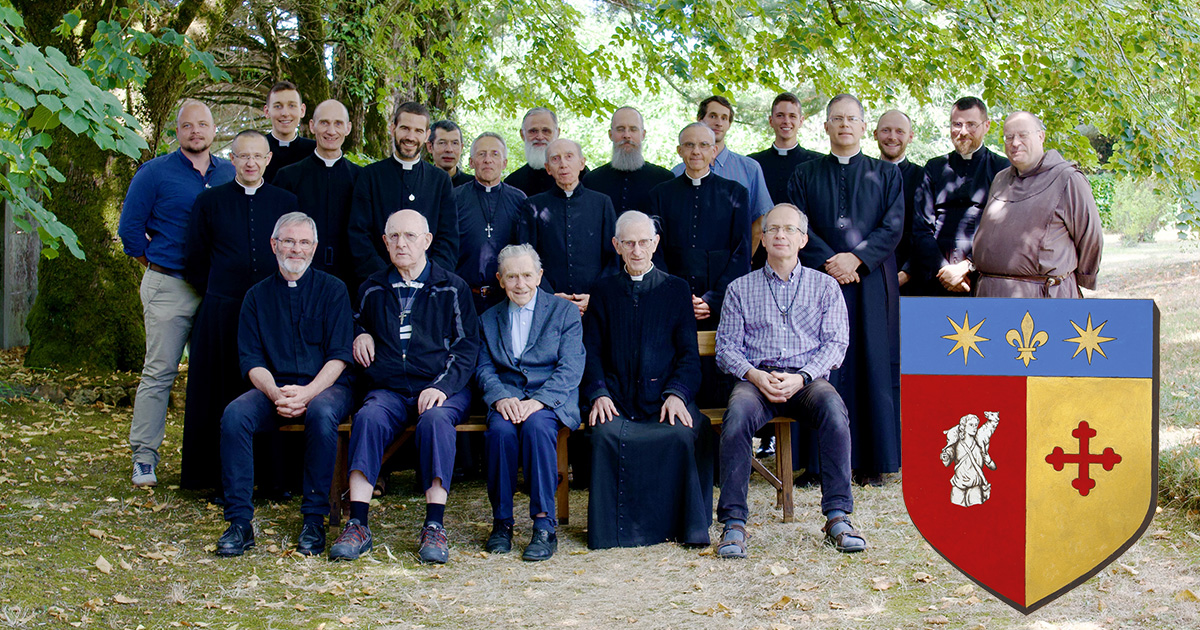History and Spirituality of the Oblates of St. Vincent de Paul
The Oblates of St. Vincent de Paul are a clerical religious institute of diocesan right, rooted in Vincentian spirituality. Composed of both Priests and Brothers, this congregation is driven by a special charism inspired by St. Vincent de Paul, focused on serving disadvantaged youth and families from working-class backgrounds. Their primary vocation is to provide practical and spiritual assistance to the poor, particularly to young people in difficulty.
Foundation and History
The Institute of the Oblates of St. Vincent de Paul was founded in 2008, on the initiative of about twenty priests and brothers of the French Province of the Religious of St. Vincent de Paul. This decision arose in a context where a particular need for attention and service to troubled youth was felt. These religious, eager to continue their commitment to serving young people and families, founded their own institute under the guidance of Bishop Guy-Marie Bagnard, Bishop of the Diocese of Belley-Ars, who canonically erected the Institute.
Since its foundation, the Institute has established itself in three strategic regions, forming active religious communities. These communities are located in Bourg-en-Bresse, Le Puy-en-Velay, and La Roche-sur-Yon (France), the latter housing the general services of the Institute, as well as the formation house, which includes both the novitiate and the scholasticate. From the outset, the Institute has emphasized the rigorous formation of its members, urgently responding to the spiritual and material needs of disadvantaged children and families.
Vincentian Spirituality: Charity and Evangelization
The spirituality of the Oblates of St. Vincent de Paul is intimately linked to that of St. Vincent de Paul, the great apostle of charity. Faithful to this legacy, the Oblates strive to embody evangelical charity by seeing the face of God in every person they serve, especially among the poorest and abandoned youth.
- Charity Towards Youth and the Poor: One of the primary goals of the Oblates is the evangelization of children and families from working-class backgrounds. They work to address their material, educational, and spiritual needs. This commitment to youth is not only a social mission but also a deeply evangelical one, reflecting St. Vincent de Paul’s teaching that we must begin with the smallest to change the world. The congregation is active in sectors such as Christian education, assisting youth in difficulty, and family pastoral care.
- Community Life and Fraternity: Community life is a fundamental aspect of the Oblates. Priests and Brothers live together, sharing a life of prayer, work, and mutual support. This communal life is marked by simplicity and closeness, following the example of the spiritual family that St. Vincent de Paul promoted in his works. Their fraternity is lived out daily through community activities, moments of prayer, and a shared commitment to their mission of evangelization and service.
- Mission of Evangelization: The Oblates are also missionaries at the heart of society. Their evangelizing mission is rooted in a pastoral approach aimed at reaching families who are distant from the Church or facing social difficulties. Through their presence in parishes and charitable works, the Oblates seek to bring these people closer to the Christian faith, embodying a testimony of compassion and service.
Formation and Vocations
The Institute places great importance on the formation of its members. The formation house, located in La Roche-sur-Yon, houses the novitiate and scholasticate, allowing young vocations to be trained for religious life in the Vincentian spirit. The formation process includes theological, spiritual, and pastoral studies, as well as practical service to youth and the poor.
Formation places particular emphasis on living out charity in everyday life and communal prayer. Future Oblates learn to combine spiritual life with active service, following the model of St. Vincent de Paul. This journey aims to prepare Priests and Brothers to meet the challenges of the modern world while remaining faithful to the Gospel.
The Houses of the Oblates of St. Vincent de Paul
The three Oblate communities are located in France, each with a specific role in the Institute’s mission.
- La Roche-sur-Yon: Located in the Diocese of Luçon, this house serves as the Institute’s headquarters and formation house. Young vocations receive comprehensive training here, both spiritual and practical. It is a place of prayer, study, and discernment, but also a center of pastoral action for local youth.
- Bourg-en-Bresse: This house, located in the Diocese of Belley-Ars, is an active center for evangelization for families and youth. It offers various pastoral activities such as retreats, catechetical training, and spiritual accompaniment. The community is strongly involved in the diocesan mission.
- Le Puy-en-Velay: This house is a place of pilgrimage and spirituality. The Oblates welcome pilgrims seeking spiritual renewal. It is a center of prayer where the community works to nourish the faith of visitors while remaining faithful to the spirit of charity and service. The community also organizes pastoral activities for local families.
— – —
The Oblates of St. Vincent de Paul continue with zeal the mission of their spiritual founder, St. Vincent de Paul, embodying active charity and evangelization focused on youth and the poor. Their Institute, founded in 2008, is a testimony to the vitality of Vincentian spirituality in the contemporary world. Through their houses and works, the Oblates put their vocation into practice by serving the most vulnerable, forming fraternal communities centered on prayer, education, and spiritual accompaniment. Their commitment embodies a Gospel response to the urgent needs of our time, faithful to the message of the Gospel and the legacy of St. Vincent de Paul.
Contact:
- Address: 73, rue du Maréchal Juin, 85000 La Roche-sur-Yon (Francia)
- Telephone: +33 2 51 37 09 88
- Email: p.general.osv@gmail.com
- Website: https://www.oblats-de-saint-vincent-de-paul.fr/
Tags:








0 Comments